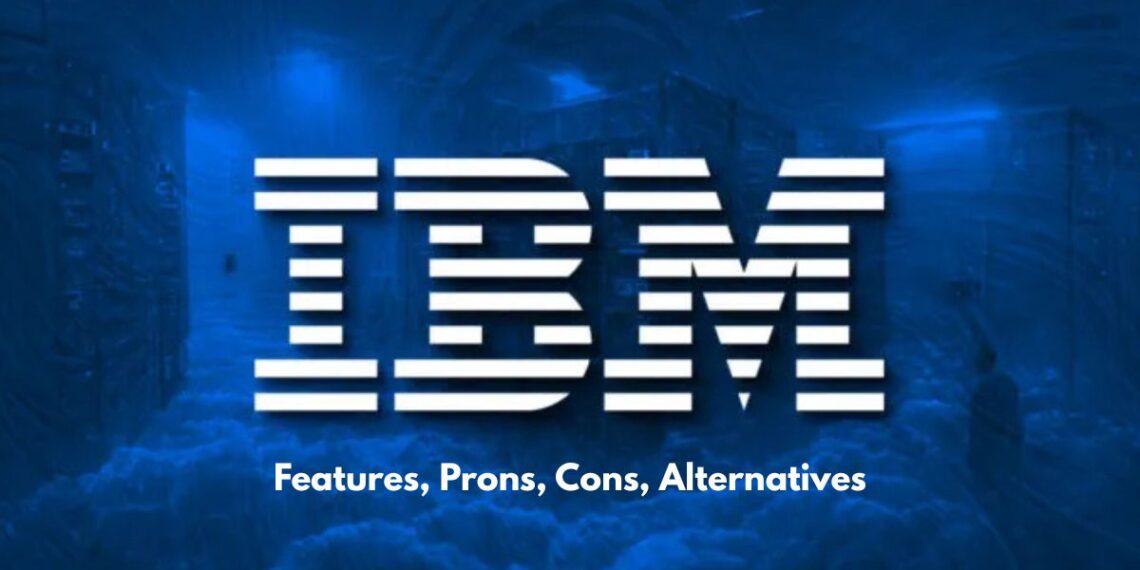For startups navigating growth in AI, data, and secure infrastructure, the right cloud partner can shape long-term success. 📊 While AWS, Microsoft Azure, and Google Cloud dominate the startup conversation, IBM for Startups deserves serious consideration—especially for founders building B2B, AI-first, or regulated-industry products. 🌐💼
In this guide, we’ll break down everything IBM has to offer—from game-changing AI tools to enterprise-level cloud credits—so you can decide if this powerful platform is the launchpad your startup needs to thrive. 🚀
IBM Overview
IBM, one of the most established names in enterprise technology, has spent the last decade transforming its legacy into a startup-friendly innovation hub. Through a blend of technical resources, cloud credits, and go-to-market opportunities, it now offers a comprehensive ecosystem specifically designed to support early-stage ventures. 🛠️🌐
At the center of this ecosystem are programs like Startup with IBM, IBM Partner Plus, and the Hyper Protect Accelerator. These initiatives are not isolated perks—they’re strategic entry points into IBM’s broader cloud, AI, and enterprise client landscape.🌟 Startups that join can receive up to $120,000 in IBM Cloud credits, gain access to over 170 cloud services, and work directly with its solution architects and mentors. Startups building in AI, hybrid cloud, blockchain, or highly regulated sectors like healthcare and fintech are especially well-positioned to benefit.☄️🚀
What sets IBM apart is its dual focus: enabling startups to scale with powerful tools while also providing a go-to-market runway through co-selling opportunities, technical certification pathways, and access to its global enterprise client base🌎. Whether through watsonx’s generative AI tools or Red Hat OpenShift’s cloud-native development stack, it is positioning itself not just as a tech vendor, but as a long-term enterprise growth partner.💡
IBM Key Features
IBM offers a broad suite of cloud services and advanced tools tailored for early-stage ventures. From cutting-edge AI to enterprise-ready infrastructure, these features are designed to help startups build, scale, and compete in demanding markets.
☁️ Cloud Infrastructure Access
Offers scalable IaaS and PaaS through IBM Cloud, including virtual servers, bare metal, and serverless compute with Code Engine.
🤖 AI Tools: Watson & watsonx
Startups get access to watsonx.ai for model building, watsonx.data for scalable data operations, and watsonx.governance for responsible AI practices.
📊 Data & Analytics Platforms
Includes Db2 Warehouse, Cognos Analytics, and Watson Studio for insight generation, reporting, and data lake management.
🐳 Red Hat OpenShift Integration
Enables Kubernetes-based containerization and orchestration, critical for startups focused on modern DevOps and hybrid cloud.
🔒 Enterprise-Grade Security
Built-in security and compliance, with options like Cloud Hyper Protect Services for confidential computing and AI pipeline protection.
🚀 Go-to-Market & Ecosystem Support
Opportunities for co-selling, IBM Marketplace listings, and networking with IBM’s enterprise clients and partners.
🧑🏫 Technical Mentorship & Training
Dedicated support from IBM architects, 24/7 enablement, and access to training resources used by IBM employees.
🛡️ Blockchain Services
Access to IBM’s Blockchain Platform built on Hyperledger Fabric for applications in finance, supply chain, and identity.

IBM Pros and Cons
👍 Pros
- Access to powerful AI, hybrid cloud, and security tools
- Generous cloud credits (up to $120,000)
- Strong go-to-market support
- Ideal for B2B, regulated, and AI-centric startups
- 24/7 technical mentorship
- Free training and upskilling resources
👎 Cons
- Platform complexity and steep learning curve
- Credits expire monthly; no rollover
- Higher long-term costs post-credits
- Potential vendor lock-in with proprietary services
- Not ideal for simple, consumer-first applications
Considering IBM for Startups: Key Questions
Before committing to IBM’s startup ecosystem, it’s worth pausing to assess fit. These guiding questions will help you determine if its tools, support structure, and enterprise focus align with your current needs and future vision.
✨ Is your startup targeting enterprise clients or regulated industries?
If you’re building products for financial services, healthcare, or government sectors, its compliance-ready cloud and enterprise credibility can be a major advantage.
💰 Will IBM’s cloud credits provide real runway for your MVP or scaling?
With up to $120K in credits, IBM can offset major infrastructure costs—but you’ll need a plan for managing usage and costs once the credits expire.
🧱 Does your team have the technical capacity to handle IBM’s learning curve?
Its tools are powerful but complex. Startups with DevOps and cloud engineering expertise will be better equipped to navigate them.
🔗 Do you plan to use AI, blockchain, or hybrid cloud in your product roadmap?
IBM shines in these areas. If these technologies are core to your product, you’ll benefit from specialized tools like watsonx and IBM Blockchain.
💼 Are you ready to actively engage with a large corporate ecosystem?
It offers go-to-market support and enterprise access, but leveraging it requires proactive engagement, structured onboarding, and relationship-building.

IBM for Startups Plans and Pricing
IBM’s startup support is tiered and credit-based, depending on your stage and partner affiliation.
| Plan / Program | Monthly Credit | Duration | Key Eligibility |
|---|---|---|---|
| Startup with IBM – Builder | $1,000 | 12 months | <5 years old, <$1M revenue |
| Startup with IBM – Premium | $10,000 | 12 months | Must be part of VC/incubator network |
| Hyper Protect Accelerator | $10,000 | 12-24 mo | Focused on FinTech/HealthTech |
Once credits expire, startups transition to:
- Pay-As-You-Go (most flexible)
- Lite plans (free-tier usage for 40+ services)
- Subscriptions/Reserved Instances (discounted bulk usage)
IBM Startup Discount and Promo Info
IBM doesn’t offer traditional promo codes. Instead, eligible startups receive up to $120,000 in credits🌟 through structured programs. Discounts🎁 apply to new users, especially those affiliated with accelerators or VC partners. Always check eligibility terms for your region and startup stage.
Comparing IBM for Startups with Alternatives
| Feature 🔍 | IBM for Startups | AWS Activate | Microsoft Founders Hub | GCP for Startups |
|---|---|---|---|---|
| 💸 Max Cloud Credits | $120K | $100K–$300K | Up to $150K | Up to $350K |
| 🤖 AI Tools | watsonx, Watson | SageMaker | Azure OpenAI | Vertex AI |
| 🔐 Security Focus | Hyper Protect, Governance | Standard | Standard + OpenAI Guardrails | Confidential VMs |
| 🛒 Marketplace Access | IBM Marketplace | AWS Marketplace | Microsoft Partner Co-sell | Google Marketplace |
| 🎯 Target Strength | B2B, AI, RegTech | Scalable apps | MS-integrated startups | Data/AI startups |

FAQs
❓ Can non-technical founders benefit from IBM programs?
Yes, but technical guidance is key. It provides mentorship and pre-built templates to reduce complexity.
❓ What happens after credits expire?
You’ll move to standard billing (PayGo, subscription, or reserved instances). Planning ahead is crucial.
❓ Does IBM support integrations with other platforms?
Yes. Many its services use open standards, and Red Hat OpenShift aids integration.
❓ Is IBM good for AI/ML startups?
Absolutely. watsonx.ai and related services support generative AI, data governance, and ML deployment.
❓ Are there hidden costs?
Not really—pricing is transparent, but advanced features may come with higher usage costs post-credits.
Final Thoughts
IBM for Startups presents a unique opportunity for ambitious ventures that are ready to build at an enterprise level. 💼 With powerful AI capabilities through watsonx, scalable hybrid cloud infrastructure via IBM Cloud and OpenShift, and best-in-class security features like Hyper Protect, the platform is especially well-suited for startups in complex, regulated, or innovation-driven sectors such as FinTech, HealthTech, Cybersecurity, and AI SaaS. 🧠🌐 IBM’s generous $120K in cloud credits, paired with personalized mentorship and co-selling support, offers more than technical resources—it delivers strategic acceleration. 🚀
That said, IBM isn’t the plug-and-play option for every startup. ⚙️ Its vast product suite and enterprise-grade tools come with a learning curve. 📚 Navigating the platform—and extracting real value—requires technical readiness and proactive engagement. Once credits expire, managing post-credit costs and avoiding vendor lock-in will require financial planning and architectural foresight. 💸📊
💡If your team has the technical chops, a B2B focus, and is building something deeply aligned with AI, cloud innovation, or enterprise data needs, IBM might be more than just a cloud provider—it could be your long-term partner in scaling with confidence and credibility. 🤝










